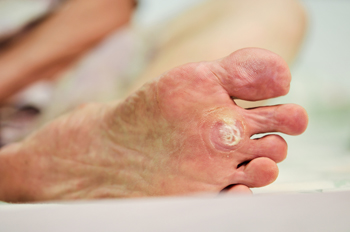
Papillomas, also known as warts, are caused by coming into contact with the human papilloma virus, or HPV. One type of papilloma found on the feet is termed a plantar wart. The HPV virus is commonly picked up in humid communal environments, such as public showers and swimming pools. The best way to avoid being exposed to these contagious papillomas on your feet is to wear appropriate foot coverings in public places such as showers, locker rooms, and pools. A plantar wart typically appears as a small, rough growth on the bottom of your foot, usually at the base of the toes, or on the ball or heel. In some cases, the wart may contain black pinpoints, which are small clotted blood vessels, commonly called wart seeds. While a plantar wart may resolve without treatment, seeking advice from a podiatrist can help to minimize its spread and any discomfort it causes. If the wart reoccurs, and especially if it is bleeding, painful, or there are changes in shape or color, it is suggested that you schedule an appointment with a podiatrist for immediate treatment.
Plantar warts can be very uncomfortable. If you need your feet checked, contact Harvey Jacobs, DPM from Quality Foot Care Center. Our doctor will assist you with all of your foot and ankle needs.
About Plantar Warts
Plantar warts are the result of HPV, or human papillomavirus, getting into open wounds on the feet. They are mostly found on the heels or balls of the feet.
While plantar warts are generally harmless, those experiencing excessive pain or those suffering from diabetes or a compromised immune system require immediate medical care. Plantar warts are easily diagnosed, usually through scraping off a bit of rough skin or by getting a biopsy.
Symptoms
- Lesions on the bottom of your feet, usually rough and grainy
- Hard or thick callused spots
- Wart seeds, which are small clotted blood vessels that look like little black spots
- Pain, discomfort, or tenderness of your feet when walking or standing
Treatment
- Freezing
- Electric tool removal
- Laser Treatment
- Topical Creams (prescription only)
- Over-the-counter medications
To help prevent developing plantar warts, avoid walking barefoot over abrasive surfaces that can cause cuts or wounds for HPV to get into. Avoiding direct contact with other warts, as well as not picking or rubbing existing warts, can help prevent the further spread of plantar warts. However, if you think you have developed plantar warts, speak to your podiatrist. He or she can diagnose the warts on your feet and recommend the appropriate treatment options.
If you have any questions please feel free to contact our office located in Somerset, NJ . We offer the newest diagnostic and treatment technologies for all your foot and ankle needs.